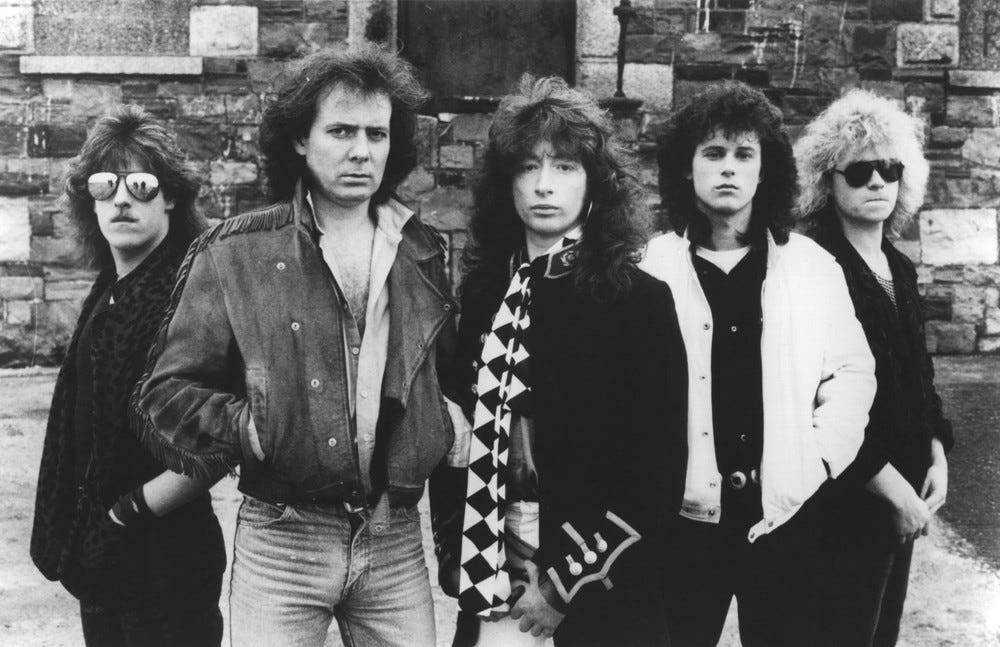Fastway | History of the Band
Too heavy for radio, too melodic for metal—Fastway lived in the margins
What happens when you take a Motörhead lifer and pair him with a UFO runaway? In 1982, “Fast” Eddie Clarke and Pete Way tried to find out. They called it Fastway—a no-brainer blend of their surnames—and aimed to inject some grit into the rock landscape. But before they could get the band off the ground, Pete Way had to exit thanks to label red tape with Chrysalis. Clarke soldiered on, roping in Humble Pie drummer Jerry Shirley and a then-unknown Irish vocalist, Dave King, who sounded like Robert Plant if he grew up on Guinness and Thin Lizzy.
Mickey Feat came in to play bass—though uncredited—and just like that, Fastway’s first lineup was born. Barely. But they had fire in the tank.
Richard Waterman suggested this artist for a future Dig Me Out podcast episode. Each month, our Paid Subscribers are presented with a selection of albums suggested by listeners and asked to vote for their favorite.
From the jump, Fastway didn’t care about fitting into a box. Not NWOBHM, not glam, not punk. This was blues-drenched, riff-first rock. Think AC/DC down a London alley, or Zeppelin minus the mysticism. Clarke’s guitar tone was thick, rugged, and hotwired for air guitar. King had that rare blend of soul and snarl that made every chorus hit harder.
But like so many ‘80s bands, Fastway evolved with the times. By Waiting for the Roar, keyboards crept in, production got slicker, and they flirted with AOR territory. Some fans balked. Others rolled with it. Either way, it marked a turning point.
Discography and Notable '80s Albums
Fastway (1983 – CBS Records)
Cue up “Say What You Will,” and you're instantly back in a basement with your first boombox. That riff? Pure adrenaline. Produced by Eddie Kramer, the debut nailed that sweaty, denim-jacket sound and climbed to #31 on the Billboard 200. It was a shot of raw power that proved Clarke had more to say post-Motörhead—and that Dave King was a frontman to watch.
All Fired Up (1984 – CBS Records)
Built for the road. With Shirley still on drums and Kramer back in the booth, All Fired Up turned up the melody without losing the muscle. Songs like “Tell Me” hinted at a band trying to stretch out while staying true. Critics were into it. Fans, too. But the charts didn’t bite as hard this time.
Waiting for the Roar (1986 – Columbia Records)
Abbey Road Studios, new band members, and a brand-new sound. Waiting for the Roar dropped the boogie for big keys and glossy hooks. Some called it a misstep. Others saw it as ambition. Either way, it didn’t light up the charts, but it marked a bold left turn that showed Fastway wouldn’t be boxed in.
Trick or Treat (1986 – Columbia Records)
The soundtrack to your Halloween VHS collection. Trick or Treat saw Fastway roar back with meaty riffs and metal attitude. It doubled as the soundtrack to the cult horror flick and gave Clarke a chance to reclaim his guitar-hero status. The album stayed on the Billboard charts for nearly a year and still gets love every spooky season.
On Target (1988 – GWR Records)
Dave King exited stage left, and Lea Hart stepped in. The result? A sleeker, more commercial sound that leaned toward the mainstream. On Target had hooks, but it missed that raw edge. Clarke was still killing it on guitar, but the chemistry had shifted.
Bad Bad Girls (1990 – Legacy Records)
Fastway’s final studio album before bowing out. Same lineup as On Target, with some Girlschool members lending a hand. The sound continued down the radio-rock lane but failed to leave a lasting impression. A quiet fade-out after a loud start.
The early buzz was real. Fastway earned nods from Kerrang! and Hit Parader for its no-nonsense energy and fresh take on hard rock. As the sound shifted, the critical love cooled. Waiting for the Roar split the room. Some praised the risk; others wanted the grit back. Still, that debut and Trick or Treat became cult favorites.
Influence and Legacy
Fastway didn’t launch a movement, but they left fingerprints. Their blues-metal blend inspired bands like The Answer and The Darkness. Dave King found a second act in the late ‘90s with Celtic punk heroes Flogging Molly, carrying that same fire with a new twist. Clarke—already a legend from Motörhead—cemented his guitar-god status with riffs that still sound fresh.
And for every Gen X kid who blasted “Easy Livin’” while thumbing through Metal Edge, Fastway became one of those underdog bands you never forgot—even if the world did.
Fastway didn’t chase trends. They barreled into the ‘80s with grit, groove, and a handful of arena-ready anthems. Their story wasn’t one of domination—it was survival, reinvention, and flashes of brilliance. A puzzle piece in the chaotic collage of ‘80s rock.




I saw em open for Ratt in the Awesome Eighties. They were amazing. Wasn't expecting Fastway today... THANKS!